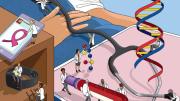As a medical student in the 1980s, Isaac “Zak” Kohane heard stories—from patients, mentors, and colleagues—of nearly miraculous recoveries from cancer. A patient given weeks to live instead survives for years. An experimental drug works exceptionally well—in only one patient. Or, most controversially, a patient rejects chemotherapy, radiation, and surgery, and somehow lives. As a trainee, Kohane found many such stories quite literally unbelievable. “Frankly,” he says, “I assumed that they didn’t really have a cancer.”
Now Nelson professor of biomedical informatics at Harvard Medical School (see “Toward Precision Medicine,” May-June 2015, page 17), Kohane not only believes these stories, he’s seeking them out. A year ago, he began a project to find “exceptional responders” to cancer treatment—those who have beaten the cancer odds many times over—in order to figure out what makes them special.
He was inspired initially by a very different group of patients. Since 2014, Kohane has coordinated a nationwide program to study and aid patients whose affliction with rare, undiagnosed diseases mark them as statistical outliers. “Outliers, by definition, are interesting,” he explains, because they are different from everybody else, “so there are things to be learned. By finding these outliers, we have been able to make breakthroughs both for the patient but also scientifically,” diagnosing more than 300 patients suffering from newly discovered genetic diseases in five years.
By investigating exceptional responders, Kohane now hopes to find new paths to cancer treatment, rather than new diseases. The study has thus far recruited more than 75 participants from around the United States, representing 24 different types of cancer. Many of the subjects responded exceptionally well to a conventional combination of surgery, radiation, and chemotherapy; others took part in clinical trials of new therapies, and were profoundly successful. At least one survived with no conventional therapy at all. By collecting as much data as possible from these patients—sequencing their DNA, inventorying their gut microbes, and even asking them for access to data from their social- media pages and FitBit fitness trackers—Kohane hopes to draw connections between their successes and the underlying causes that may have saved them.
Such comprehensive study, he says, is possible in large part because of recent medical advances, not only in the genetic sequencing that will give the researchers gigabytes of data about the participants’ genomes, tumors, microbiomes, and immune systems, but also in the machine-learning systems that make it possible to sift through all that biometric data, and other, more narrative information. “Some of our patients,” Kohane points out, “will have hundreds if not thousands of pages detailing their [medical] history.” He aims to use automated systems to sift through those histories for common elements, to make connections that unaided humans couldn’t—for example, noticing a shared exposure to a particular infectious disease long before cancer struck. “Doctors, human beings, will look for individual things,” says Kohane. “These programs are looking for everything.”
Of course, there’s a sizable gap between finding something a few exceptional responders have in common and understanding whether—and how—that explains their success. “Certain kinds of associations will be indistinguishable from a fluke,” he says, especially when they pertain only to a handful of participants. “For those rare cases, we’ll have to find a mechanism, something that actually explains the association.”
But he also hopes the study will find some trait that many exceptional responders possess, across their different cancer types. “We think in addition to the smattering of exceptional but rare [responses], there will be some common mechanism for a subset of these patients that will have to do either with the immune system or with the way it manages chromosomal instability” (the ability to repair DNA copying errors).
Technological advances aside, though, Kohane says the study has also been enabled and inspired by a newly powerful trend affecting and directing medical research. “The notion of patient-driven, advocacy-driven medicine is very different from the paternalistic view of medicine of even 30 years ago,” he explains. He describes the exceptional responders—eager to share their health data for research, with little or no benefit to themselves—as “data altruists.” Though he’s careful to warn them that genetic information is difficult to keep entirely anonymous, and the data, though not public, will be shared widely with other researchers, “They’re urgently passionate that we need to look at them.”
To empower this altruistic impulse, the exceptional-responder study will give participants access to all the data it collects on them, to discuss with their own physicians, or share with other studies. But Kohane says they see another benefit of joining the study. “We get letters from patients saying, ‘I’ve been wondering why I alone of all my cohort in this clinical trial survived,’” he explains. “This is giving meaning to their experience, that maybe their experience could actually help others.”









